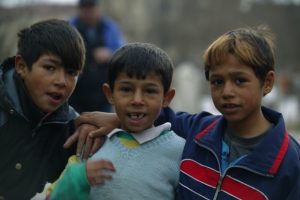Community integration and schooling of Roma children in Leposavic and Prizluje camps
State: Completed | Number of beneficiaries: 80 children per year
Duration of the project: 2002 – 2012

Local partner
D.E.A Mitrovica, Democracy, Education, Advocacy, is a local NGO created by former PADEM employees in Kosovo.
The problem
Progress has been made in areas such as education, the use of languages in public and private life. However, these positive measures remain insufficient in relation to the needs expressed. The fact that the parallel schools following the Serbian curriculum and financed by the Ministry of Education and Sport of Serbia continue to operate implies the existence of a separate school system. The schools keep Serbian pupils away from the majority community and reflect the lack of confidence in Kosovo’s educational institutions, as well as the security concerns that exist within the Serbian community. Today in Kosovo, despite the existence of some initiatives of shared schools between Serbian and Albanian pupils, there is often no possibility for these two groups to have contact between them within the school and their simple coexistence in one school is often difficult to achieve. Fears for security have prompted Serbian students to visit the enclaves for training, despite the difficult transport conditions and the quality of the services provided that are lacking. Many Roma children have been outside the school system for several years and need to be reintegrated Physical access to institutions providing mother tongue education is considered a recurring problem by representatives of different communities.
Objectives / Activities
The objective of the project was to promote the integration of displaced Roma communities in the municipality of Leposavic and living in the Prizluje enclave.
Activities carried out:
- Promote the integration of Roma children into the “normal” education system
- Renovation of schools
- Payment of teachers’ salaries
- Vocational training for mothers (income generating activities)
- Organization of extracurricular activities
- Breakfast at school
- Vocational training of young people and women
- Support for the elderly Roma
Beneficiaries
- Direct beneficiaries: 80 beneficiaries per year.
- Indirect beneficiaries: a hundred parents.
